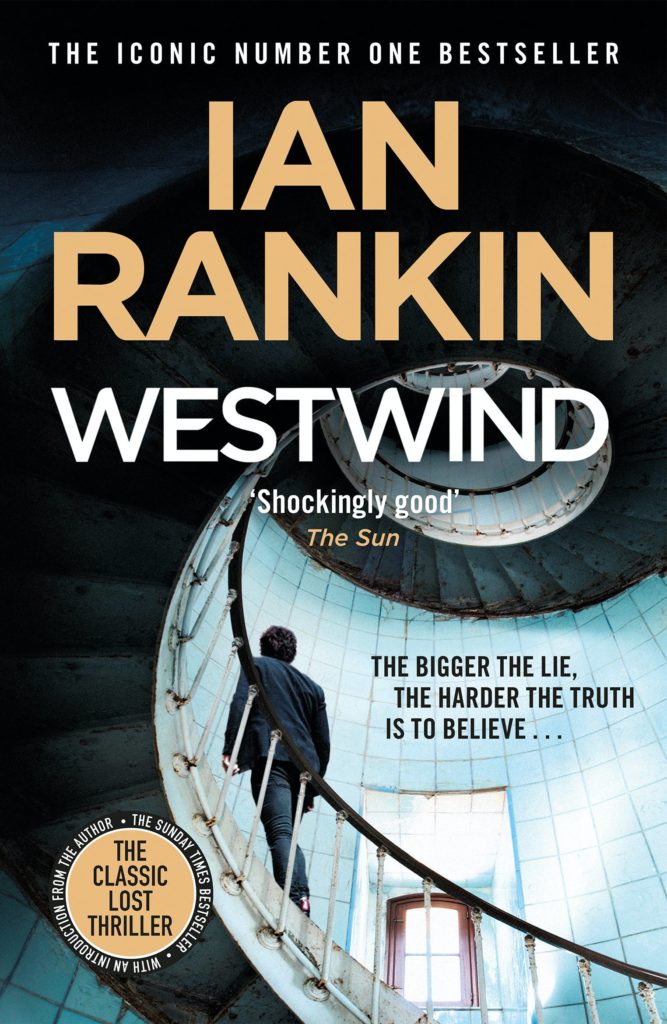
Westwind: the Ian Rankin novel that got away. Published to little fanfare and few reviews back in 1990, Rankin's attempt at the "the sort of high-tech thriller that sold by the pallet-load in airports and railway stations†disappeared without trace after scarcely receiving a first printing. Fortunately for Rankin, the Rebus novels started to pay off, rendering Westwind a mere footnote until 2019. An unlikely cocktail of Twitter queries and, presumably, the concept of a calendar year looming without a new Rebus title, lead to Westwind being reissued, slightly renovated and given an introductory segment more interesting than the book that follows.
In an alternate 1990 where the US is withdrawing from Europe, satellite technician Martin Hepworth is party to a cascade of events: the crashing of a space shuttle that left only one astronaut alive, the temporary loss of contact with his base's satellite, and the sudden leave of a colleague who had noticed something was wrong. The moment Hepworth decides to investigate, he is marked for death, and he has to decide precisely which government agencies he can trust to keep him on the right side of the mortal coil.
A delight of reading early Rankin in reissued format is that he often invites the readers to look through the window of his mind at the time of reading. Westwind was written at approximately the same time as Tooth and Nail, and both novels were forged in the crucible of his London residency. Where Rebus had the luxury of hating London on Rankin's behalf, Hepton is a native and doesn't realise the misery he resides in. Rankin tells us of his career frustrations and lets us know what might have been if Rebus didn't take off as he did.
The one drawback of the foreword is that Rankin points out that at one point the novel was titled "Coffin Burialâ€, a name whose etymology entirely escapes him. Armed with this knowledge, it is impossible not to notice the multiple iterations of this phrase littered throughout the book, and even when its significance is explained it has been reduced to meaninglessness. While "Westwind†is a marginally better title, Rankin should not have tried to justify it so brazenly in the text.
Rankin considers Watchman to be his spy novel, but Westwind would comfortably also match that designation. What likely renders it a "techno-thriller†(the technology painstakingly researched in the children's section of the library) is that Hepton is something of an everyman thrust into a sea of assassins, double crossers, and — hilariously — uniformly villainous Americans. Naturally, Hepton is the least interesting character of the ensemble, but the astronaut who forms one point of the book's distant love triangle is a close second.
Michael Dreyfuss is a fascinating character because he is the only person in the book ever to have been to space, and nobody likes him. At the time of publication, literally no British person had ever left Earth's atmosphere, and as of September 2020 only seven Britons total have been in space, but Dreyfuss is the novel's pariah, a fall guy whose biggest crime is that he failed to die when it would have been politically expedient. The way that Rankin layers on the man's flaws as a subpar space cadet whose main ability is to take up space is funny — perhaps unintentionally so, but welcome nonetheless.
Westwind putters along at an amiable pace, and Hepton picks up a merry troupe that includes the woman hell bent on killing him and, that classic, the slightly older gentleman whose unassuming nature belies his ability to snap someone's neck and dump their corpse in an airport toilet. Far ahead of his time, Rankin's female characters are the most consistently competent, and he does absolutely nothing to sexualise them.
Westwind works best as a time capsule, as there is nothing described between its pages that is not humorously dated. The spy craft is remarkably analogue, and there are few problems that can't be solved simply by killing someone; the most fun Rankin has, other than sneering at Dreyfuss, is by having people play their hands catastrophically too early. The conclusion is optimistic in a way that, thirty years later, is difficult to read as anything other than naïve and, though the tribalism at the villains' heart is unlikely at best, the sort of surveillance culture Rankin warns against has become far worse than anything he could have imagined thirty years ago.
Westwind is a novel that is "better than you think it isâ€, but it is clearly not where Rankin's heart or talents lay. Its curious nature and Rankin's thoughtful dissection thereof justifies its return to print., but Westwind is not a long lost treasure finally restored to the light so much as a cheerful throwback to what publishing used to be. Rebus is back in 2020, and he's welcome, but you could do worse than Hepton.


